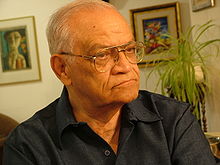- Moshe Gueron
-
Moshe Gueron
Moshe GueronBorn March 20, 1926
Sofia, BulgariaEducation Hebrew University of Jerusalem, University of Cincinnati, Soroka Medical Center. Known for Performing the first successful Catheterization in Israel.
First Research regarding to Cardiovascular Manifestations of Severe Scorpion Sting.Profession Cardiologist and Researcher Institutions Soroka Medical Center
University of CincinnatiSpecialism Cardiovascular diseases Professor Moshe Gueron (born March 20, 1926) is a pioneering cardiologist and researcher.
Contents
Introduction
Gueron was born in Sofia, Bulgaria and received his bachelors and M.D. degrees from Hebrew University of Jerusalem. After World War II, he emigrated from Bulgaria to Israel and lived in Tel-Aviv with his parents. Graduating in 1964, Gueron moved to Beer-Sheba where he was founded the Department of Cardiology in Soroka Medical Center after Professor Harry Heller, Chief of Medicine at the Sheba Medical Center, led him to his position by matching between him and Moshe Soroka, one of Soroka Medical Center's founders, who was looking to establish a Cardiology Department at that time.
Medical training
Gueron worked together with Professor Noble O. Fowler, which was his master at University of Cincinnati, where he was doing his specialization and generalization in medicine.[1] Fowler, was a medical scholar of the highest order and functioned as a Director of the Division of Cardiology in Department of Internal Medicine of Medicine College (1970–1986) of University of Cincinnati, and Professor Emeritus at the same institution from 1984 to the time of his death (March 8, 2003) from prostatic carcinoma. Fowler was graduated from the University of Tennessee College of Medicine with a Faculty Medal and a Certificate of Honor in 1941. In May 1997, it was reported that an Israeli medical research team led by Professor Gueron haf found the relationship between angina pectoris and the severity of coronary artery disease.[2] It is hoped that such tissue will be used eventually for transplantation in humans suffering from heart disease.
Medical career
Gueron was appointed Professor at Soroka Medical Center in 1967, and was involved in the development of the techniques of heart and heart-lung treatment.[3] Gueron is best known for a research he has managed regarding the treatment of scorpion evenomation and its affection on the human's heart.[4] During his research, thousands of stung patients were reviewed. Gueron's research has shown that thirty-four patients with severe scorpion sting were reviewed and pertinent data related to the cardiovascular system such as hypertension, peripheral vascular collapse, congestive heart failure or pulmonary edema were analyzed.[5] The electrocardiograms of 28 patients were reviewed, 14 patients showed "early myocardial infarction-like" pattern. The urinary catecholamine metabolites were investigated in 12 patients with scorpion sting. Vanylmandelic acid was elevated in seven patients and the total free epinephrine and norepinephrine in eight. Six of these 12 patients displayed the electrocardiographic "myocardial infarction-like" pattern. Nine patients died and the pathologic lesions of the myocardium were reviewed in seven.[6] The anticipated time line is within three years depending on successful animal trials. Gueron was described hypertension, pulmonary oedema with hypertension, hypotension, pulmonary oedema with hypotension and rhythm disturbances as five different syndromes that may dominate the clinical picture in scorpion sting victim. He suggested that all patients with cardiac symptoms should be admitted to an intensive cardiac unit. Gueron was questioned regarding the value of giving antivenin, and he replied that although is freely available, all cases of scorpion sting are treated without it, and there had not been a single fatality in 1989.[7] In 1990, he reported poor contractility with low ejection fraction, decreased systolic left ventricular performance, lowered fractional percentage shortening observed in echocardiographic and radionuclide angiographic study.[7]
Retirement
Gueron has been working in Soroka Medical Center between years 1964 to 2002 and was the first for doing a catheterization in Israel,[8] and has operated on more than 100,000 patients. Having retired from performing cardiology at the age of 65, he continues to act as a high profile consultant.[9] Gueron is recognized as a world leader in heart research.[10] His contributions to the field of medicine will have spanned the better part of 70 years, since he has published more than 300 full-length research papers in national and international journals.[7] He remains much beloved by the legions of fellows he has trained and the colleagues with whom he has worked.
References
- ^ http://pt.wkhealth.com/pt/re/circ/pdfhandler.00003017-196511000-00022.pdf;jsessionid=L5QLbTJLvgtqkp8J6cMqYXnyJHfGRppQghyw9fb9kw87Nj92cS14!797288596!181195629!8091!-1
- ^ http://www3.interscience.wiley.com/journal/112209247/abstract
- ^ http://www3.interscience.wiley.com/journal/112209247/abstract?CRETRY=1&SRETRY=0
- ^ http://www.sciencedirect.com/science?_ob=ArticleURL&_udi=B6TCS-3RJX9BJ-9&_user=10&_rdoc=1&_fmt=&_orig=search&_sort=d&_docanchor=&view=c&_searchStrId=1148600684&_rerunOrigin=google&_acct=C000050221&_version=1&_urlVersion=0&_userid=10&md5=9bb452a0fd6313532ab45dd9a1aa7e54
- ^ http://chestjournal.chestpubs.org/content/57/2/156
- ^ http://content.nejm.org/cgi/content/full/361/6/631
- ^ a b c Bawaskar, H. S. (1999-03-15). Scorpion Sting: Clinical Manifestations, Management and Literature. Sangam Books Ltd. ISBN 978-8171547180.
- ^ http://en.wikipedia.org/wiki/C._Walton_Lillehei
- ^ Ilia, Reuben; Shimon Weizman & Moshe Gueron (1991). "Effects of rapid volume expansion on the right filling pressures after prosthetic valve surgery". Catheterization and Cardiovascular Diagnosis 23 (3): 169–171. doi:10.1002/ccd.1810230304. PMID 1868526.
- ^ http://www.biomedexperts.com/Profile.bme/503287/Moshe_Gueron
Publications
- Gueron, Moshe; Rema Yaron (February 1970). "Cardiovascular Manifestations of Severe Scorpion Sting: Clinicopathologic Correlations". Chest (American College of Chest Physicians) 57 (2): 156–162. doi:10.1378/chest.57.2.156. PMID 5411717. http://www.chestjournal.org/cgi/content/abstract/57/2/156. Retrieved 2008-06-13.
- Sofer, Shaul; Elliott Weinhouse, Asher Tal, Kenneth L. Wanderman, Giora Margulis, Alberto Leiberman and Moshe Gueron (1988). "Cor Pulmonale Due to Adenoidal or Tonsillar Hypertrophy or Both in Children". Chest (American College of Chest Physicians) 93 (1): 119–122. doi:10.1378/chest.93.1.119. PMID 3335141. http://www.chestjournal.org/cgi/content/abstract/93/1/119. Retrieved 2008-06-17.
- Gueron, Moshe; Ilia, R; Margulis, G (October 2000). "Arthropod poisons and the cardiovascular system" (fee required). The American Journal of Emergency Medicine 18 (6): 708–14. doi:10.1053/ajem.2000.9265. PMID 11043628. http://linkinghub.elsevier.com/retrieve/pii/S073567570077848X. Retrieved 2008-06-13.
- Ilia, Reuben; Gabriel Rosenshtein, Jean Marc Weinstein, Carlos Cafri, Akram Abu-Ful and Mosche Gueron (February 2001). "Left anterior descending artery length in left and right coronary artery dominance". Coronary Artery Disease (Lippincott Williams & Wilkins) 12 (1): 77–78. doi:10.1097/00019501-200102000-00011. PMID 11211170. http://www.coronary-artery.com/pt/re/cad/abstract.00019501-200102000-00011.htm;jsessionid=HynVp0Z0HjkGQQycrn7tpb5GWv2kxjD1TS6LwYL0vjHlFcQ48xg3!-1947435345!181195628!8091!-1. Retrieved 2008-06-13.
Categories:- Cardiologists
- Israeli Jews
- Bulgarian Jews
- Bulgarian emigrants to Israel
- People from Sofia
- 1926 births
- Living people
Wikimedia Foundation. 2010.

